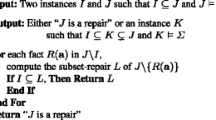Abstract
We define four different properties of relational databases which are related tothe notion of homogeneity in classical model theory. The main question for their definition is, for any given database to determine the minimum integer k, such that whenever two k-tuples satisfy the same properties which are expressible in first order logic with up to k variables (FOk), then there is an automorphism which maps each of these k-tuples onto each other. We study these four properties as a means to increase the computational power of subclasses of the reflective relational machines (RRMs) of bounded variable complexity. These were introduced by S. Abiteboul, C. Papadimitriou and V. Vianu and are known to be incomplete. For this sake we first give a semantic characterization of the subclasses of total RRM with variable complexity k (RRMk) for every natural number k. This leads to the definition of classes of queries denoted as Q C Q k. We believe these classes to be of interest in their own right. For each k>0, we define the subclass Q C Q k as the total queries in the class C Q of computable queries which preserve realization of properties expressible in FOk. The nature of these classes is implicit in the work of S. Abiteboul, M. Vardi and V. Vianu. We prove Q C Q k=total(RRMk) for every k>0. We also prove that these classes form a strict hierarchy within a strict subclass of total(C Q). This hierarchy is orthogonal to the usual classification of computable queries in time-space-complexity classes. We prove that the computability power of RRMk machines is much greater when working with classes of databases which are homogeneous, for three of the properties which we define. As to the fourth one, we prove that the computability power of RRM with sublinear variable complexity also increases when working on databases which satisfy that property. The strongest notion, pairwise k-homogeneity, allows RRMk machines to achieve completeness.
Similar content being viewed by others
References
S. Abiteboul, R. Hull and V. Vianu, Foundations of Databases (Addison-Wesley, Reading, MA, 1994).
S. Abiteboul, C. Papadimitriou and V. Vianu, Reflective relational machines, Inform. Comput. 143 (1998) 110-136.
S. Abiteboul and V. Vianu, Computing with first-order logic, J. Comput. System Sci. 50(2) (1995) 309-335.
S. Abiteboul, M. Vardi and V. Vianu, Computing with infinitary logic, Theoret. Comput. Sci. 149(1) (1995) 101-128.
S. Abiteboul, M. Vardi and V. Vianu, Fixpoint logics, Relational machines, and computational complexity, Journal of ACM 44(1) (1997) 30-56.
J. Balcázar, J. Díaz and J. Gabarró, Structural Complexity I, 2nd ed. (Springer, Berlin, 1995).
D. Barrington, N. Immerman and H. Straubing, On uniformity within NC 1, J. Comput. System Sci. 41 (1990) 274-306.
A.K. Chandra and D. Harel, Computable queries for relational data bases, J. Comput. System Sci. 21(2) (1980) 156-178.
A.K. Chandra and D. Harel, Structure and complexity of relational queries, J. Comput. System Sci. 25(1) (1982) 99-128.
C. Chang and H. Keisler, Model Theory, 3rd ed. (Elsevier/North-Holland, Amsterdam, 1992).
A. Dawar, Feasible computation through model theory, Ph.D. Thesis, University of Pennsylvania, Philadelphia (1993).
A. Dawar, S. Lindell and S.Weinstein, Infinitary logic and inductive definability over finite structure, Inform. and Comput. 119(2) (1995) 160-175.
M. Davis, R. Sigal and E. Weyuker, Computability, Complexity and Languages: Fundamentals of Theoretical Computer Science, 2nd ed., corrected printing (Academic Press, New York, 1994).
H. Ebbinghaus, Extended logics: The general framework, in: Model Theoretic Logics, eds. J. Barwise and S. Feferman (Springer, Berlin, 1985) pp. 25-76.
H. Ebbinghaus and J. Flum, Finite Model Theory, 2nd ed. (Springer, Berlin, 1999).
H. Ebbinghaus, J. Flum and W. Thomas, Mathematical Logic (Springer, Berlin, 1984).
Y. Gurevich, Logic and the challenge of computer science, in: Current Trends in Theoretical Computer Science (Computer Science Press, 1988) pp. 1-57.
N. Immerman, Upper and lower bounds for first order expressibility, J. Comput. System Sci. 25 (1982) 76-98.
N. Immerman, Descriptive Complexity (Springer, Berlin, 1999).
P. Kolaitis and M. Vardi, 0-1 laws for infinitary logic, in: Proceedings of the 5th IEEE Symposium on Logic in Computer Science (LICS) (1990) pp. 156-167.
M. Otto, Bounded Variable Logics and Counting (Springer, Berlin, 1997).
A. Seth, When do fixed point logics capture complexity classes?, in: Proceedings of the 10th IEEE Symposium on Logic in Computer Science (LICS) (1995).
J. Tyszkiewicz, Queries and algorithms computable by polynomial time existential reflective machines, Fundamenta Informaticae 32(1) (1997) 91-105.
J.M. Turull Torres, Query completeness, distinguishability and relational machines, in: Models, Algebras and Proofs: Selected Papers from the X Latin American Symposium on Mathematical Logic, Bogotá, 1995 (Marcel-Dekker, New York, 1998) pp. 135-163.
J.M. Turull Torres, Partial distinguishability and query computability on finite structures, in: The XI Brazilean Symposium on Logic, XI-EBL, Salvador, Brazil, 1996; abstract published in the Bulletin of the IGPL 3 (1996, London).
J.M. Turull Torres, A semantic characterization of relational machines and the effects of homogeneity, Research Report 150, Department of Mathematics of the University of Helsinki (1997).
J.M. Turull Torres, Untyped queries, untyped reflective machines and conditional quantifiers, in: Proceedings of the 2nd East European Symposium on Advances in Database and Information Systems, ADBIS'98, Lecture Notes in Computer Science, Vol. 1475 (Springer, New York, 1998) pp. 35-45 (extended version to appear in Annals of Pure and Applied Logic).
J.M. Turull Torres, Reflective relational machines working on homogeneous databases, in: Proceedings of the 1st International Symposium on Foundations of Information and Knowledge Systems, FoIKS 2000, Lecture Notes in Computer Science, Vol. 1726 (Springer, New York, 2000) pp. 288-303.
J.M. Turull Torres, Semantic classifications of queries to relational databases, manuscript in preparation.
Author information
Authors and Affiliations
Rights and permissions
About this article
Cite this article
Turull Torres, J.M. A study of homogeneity in relational databases. Annals of Mathematics and Artificial Intelligence 33, 379–414 (2001). https://doi.org/10.1023/A:1013132216581
Issue Date:
DOI: https://doi.org/10.1023/A:1013132216581




